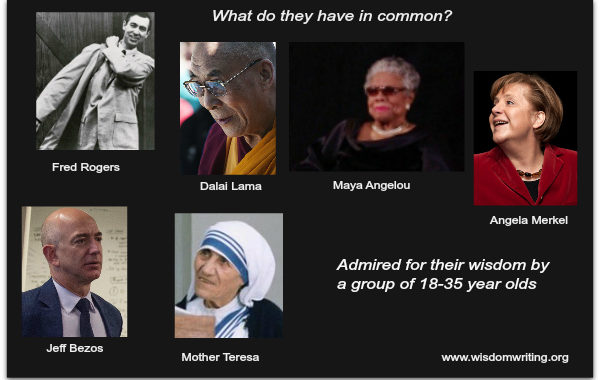Who is one of the wisest people in the world? What makes them Wise?
In a recent survey of fifty young adults between the age of 18-35, ninety-five percent named a specific person or category such as “my mother” or “my former supervisor” as their answer to the question above, with the remaining five percent listing characteristics or attributes of a wise person. Their collective responses speak volumes about their values and are summarized in the categories below.
Humanitarians. Social Activists, Religious and Political Leaders -48% of respondents
Our young people admired:
- The Dalai Lama for his example demonstrating the importance of the “bigger picture” and speaking up about important issues
- Mother Teresa for her humility and ability to deeply listen to the needs of others
- Pope Francis for his simple and elegant insights
- Dr. Martin Luther King Jr. for his connection to “something larger than himself” and communicating that connection in an understandable way
- Nelson Mandela for his incredible forgiveness and leadership
- Malala Yousafzai for using her platform appropriately to advocate for human rights
- Barack Obama for his ability to search beyond his own opinion and speak clearly about complex issues
- Maya Angelou for demonstrating how to deal with suffering
- Mother Angelica because she gave advice that was incredibly practical
- Angela Merkel for her diplomacy on a national and global level
- Yoko Ono for being a ferocious activist with a whimsical sense of wonder
Business Leaders, Celebrities and Authors -25% of respondents
Topping the list of successful entrepreneurs were Jeff Bezos for building Amazon “from nothing” and creating a path to follow, Elon Musk for pioneering solutions in sustainable energy and Liz Davidson for creating a financial business with informative articles and podcasts.
Mr. Rogers was recognized for his ability to teach morality and inclusiveness to children “without them even knowing it.”Songwriters and authors are hailed for their ability to speak their truth whether it’s Kendrick Lamar or Gary Vaynerchuk, “cutting through the noise” on social media or musician Henry Rollins, lecturing around the world on care for the less fortunate. Authors Tim Ferris and Irving Yalom were named as wise for writing about their life experience and adding to the information helping us understand human behavior.
The Elders and Work Influences -22% of respondents
This group expressed respect for input from their “elders,” a term that was extended to their parents, grandparents and anyone “who has lived through wars, depression, love and loss.” Developing strength and resiliency as a result of overcoming adversity was important to them. They appreciated the opportunity to hear first hand stories from their grandparents because they valued their “hard won perspective.” Young people also acknowledged the diverse life experience of their parents, particularly if they role modeled a willingness to listen without judgement and an openness to new ideas
The workplace was another place to discover wise people. Former supervisors were described as having offered wisdom about life, being a professional and how to lead a team of people. A very grateful respondent told of an administrator who was “patient, kind, thoughtful, and one of the most grounded people I know.” While another described a colleague as “cultured, down to earth, driven and very inspirational.”
The Unnamed -5% of respondents
“This is a tough question” remarked those who described the characteristics of wisdom instead of naming a person. A wise person needs to have:
- wide variety of life experiences
- a long list of success and failure
- genuine curiosity and interest in exploring
- figured out what makes them happy
- a strong sense of being, enlightenment and self awareness
- ability to apply their knowledge/experience to future problems
- learned from mistakes. their own and others
- recognized the fragility of life
As I was summarizing the response to the first question in my Wisdom Survey I was overcome with affection for this group of young people, many of whom I knew personally. I wanted to gather them all in a room and hear more about what is important to them. Some of their responses prompted me to do a little research about the people they admired and I was inspired.
Do you think that Millennial and GenZ respondents consider themselves to be wise?
To read their answers click here.
To start at the beginning of the series click here
